Background and performance history
The Second Hurricane was Copland's first attempt at composing opera and was commissioned by the Henry Street Settlement in New York City where it premiered on April 21, 1937, at the settlement's playhouse performed by students at its music school. The premiere production was designed by Orson Welles and conducted by Lehman Engel. The young Joseph Cotten played the small speaking role of Mr. Maclenahan.
The work was performed on CBS Radio May 9, 1937, in a one-hour broadcast directed by Earle McGill. [1] [2]
The work has only been sporadically performed since its premiere. During a weeklong celebration of Copland's 80th birthday in 1980, it was performed one night at Memphis State University with students from the Memphis Public Schools, directed by Robert Swift. In honor of Copland's 85th birthday, it was revived at the Henry Street Settlement in November 1985 in a production by Tazewell Thompson which restored an aria and a ballet which had been cut from the work at its premiere. [3] On the 100th anniversary of his birth, a new version was premiered at the 11th Chicago Humanities Festival. For the Chicago production the producer and musical director Michael Barrett and Jamie Bernstein Thomas (the daughter of Leonard Bernstein) wrote a new libretto updating the story from the 1930s to 2000 with the action taking place in a television studio where the protagonists describe their adventures for a cable-television show called Teen Heroes. [4] In 2014, the opera was revived in Columbia, South Carolina as a co-production between the University of South Carolina's Magellan scholar program, Opera at USC, FBN Productions, Inc., and Columbia Music Festival Association. The cast was composed of community students from across the Midlands region of South Carolina and was directed by University of South Carolina senior Kate McKinney.
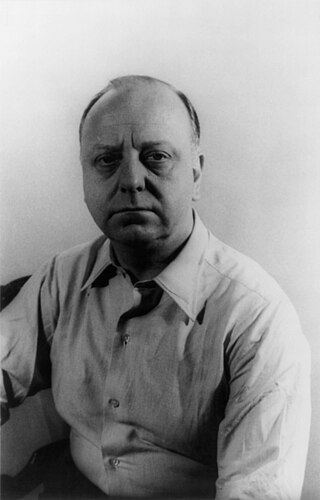
Virgil Thomson was an American composer and critic. He was instrumental in the development of the "American Sound" in classical music. He has been described as a modernist, a neoromantic, a neoclassicist, and a composer of "an Olympian blend of humanity and detachment" whose "expressive voice was always carefully muted" until his late opera Lord Byron which, in contrast to all his previous work, exhibited an emotional content that rises to "moments of real passion".

Carlisle Sessions Floyd was an American composer primarily known for his operas. These stage works, for which he wrote the librettos, typically engage with themes from the American South, particularly the Post-civil war South, the Great Depression and rural life. His best known opera, Susannah, is based on a story from the Biblical Apocrypha, transferred to contemporary rural Tennessee, and written for a Southern dialect. It was premiered at Florida State University in 1955, with Phyllis Curtin in the title role. When it was staged at the New York City Opera the following year, the reception was initially mixed; some considered it a masterpiece, while others degraded it as a 'folk opera'. Subsequent performances led to an increase in Susannah's reputation and the opera quickly became among the most performed of American operas.

Appalachian Spring is a ballet created by the American composer Aaron Copland and the choreographer Martha Graham, later arranged as an orchestral work. Commissioned by Elizabeth Sprague Coolidge, Copland composed the ballet for Graham; the original choreography was by Graham, with costumes by Edythe Gilfond and sets by Isamu Noguchi. The music was well-received at the 1944 premiere, earning Copland the Pulitzer Prize for Music after the ballet's 1945 United States tour. The orchestral suite composed in 1945 was played that year by many symphony orchestras; the suite is among Copland's best-known works, and the ballet remains essential in the Martha Graham Dance Company repertoire.
Symphony No. 3 was Aaron Copland's final symphony. It was written between 1944 and 1946, and its first performance took place on October 18, 1946 with the Boston Symphony Orchestra performing under Serge Koussevitzky. If the early Dance Symphony is included in the count, it is actually Copland's fourth symphony.
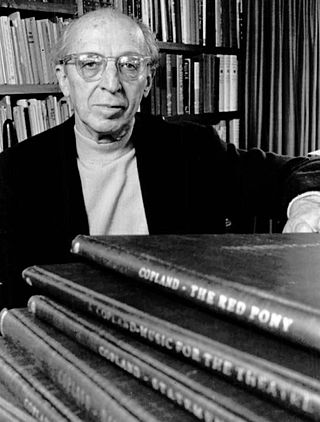
Connotations is a classical music composition for symphony orchestra written by American composer Aaron Copland. Commissioned by Leonard Bernstein in 1962 to commemorate the opening of Philharmonic Hall in New York City, United States, this piece marks a departure from Copland's populist period, which began with El Salón México in 1936 and includes the works he is most famous for such as Appalachian Spring, Lincoln Portrait and Rodeo. It represents a return to a more dissonant style of composition in which Copland wrote from the end of his studies with French pedagogue Nadia Boulanger and return from Europe in 1924 until the Great Depression. It was also Copland's first dodecaphonic work for orchestra, a style he had disparaged until he heard the music of French composer Pierre Boulez and adapted the method for himself in his Piano Quartet of 1950. While the composer had produced other orchestral works contemporary to Connotations, it was his first purely symphonic work since his Third Symphony, written in 1947.
The Tender Land is an opera with music by Aaron Copland and libretto by Horace Everett, a pseudonym for Erik Johns.
Boosey & Hawkes is a British music publisher purported to be the largest specialist classical music publisher in the world. Until 2003, it was also a major manufacturer of brass, string and woodwind musical instruments.
Jack Hamilton Beeson was an American composer. He was known particularly for his operas, the best known of which are Lizzie Borden, Hello Out There!, and The Sweet Bye and Bye.
The Piano Variations of American composer Aaron Copland were written for piano solo from January to October 1930. They were dedicated to American writer and literary critic Gerald Sykes, and were originally published in 1932 by Cos Cob Press, which merged with Arrow Music Press in 1938 and was taken over by Boosey & Hawkes in 1956. The approximate performance time is 11 minutes.
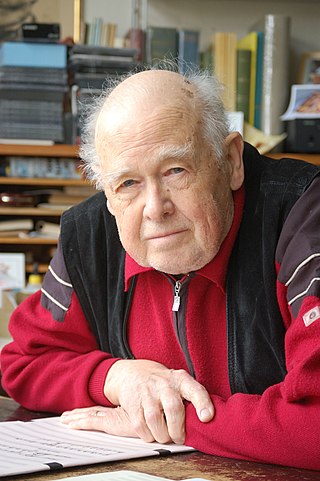
Die tödlichen Wünsche, Op. 27, is an opera by Giselher Klebe who also wrote the libretto based on La Peau de chagrin by Honoré de Balzac. It consists of fifteen lyrical scenes in three acts. It premiered on 14 June 1959 at the Deutsche Oper am Rhein in Düsseldorf, conducted by Reinhard Peters, and was published by Boosey & Hawkes. The opera was revived in 2006 at the Landestheater Detmold on the occasion of the composer's 80th birthday.

Loren Driscoll was an American tenor who had an active international career from the 1950s through the mid-1980s. Driscoll was particularly noted for his performances in contemporary operas and sang in many world premieres.
Miss Havisham's Fire is an opera in 2 acts by composer Dominick Argento with an English language libretto by John Olon-Scrymgeour. The work is loosely based on Charles Dickens' 1861 novel Great Expectations, and centers on an investigation of the circumstances surrounding the death of Aurelia Havisham. Commissioned by the New York City Opera, the work premiered on March 22, 1979, at the New York State Theater at the Lincoln Center for the Performing Arts in Manhattan.
I've Got the Tune is an American radio opera with words and music by Marc Blitzstein. Dedicated to Orson Welles, it was commissioned by CBS Radio for its experimental series, the Columbia Workshop. Its first performance was broadcast October 24, 1937, with a cast that included the composer, Shirley Booth, Lotte Lenya and Norman Lloyd. The performance was conducted by Bernard Herrmann.
Girls of the Golden West is an opera in two acts with music by John Adams and a libretto by Peter Sellars. The San Francisco Opera commissioned the work jointly with Dallas Opera, the Dutch National Opera and Teatro La Fenice in Venice. The opera was premiered in San Francisco on November 21, 2017. The running time is 160 minutes.
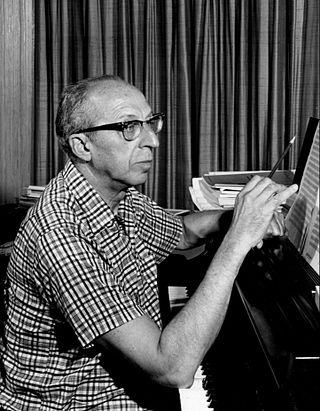
Danzón cubano is a composition for two pianos by American composer Aaron Copland. The piece, written in 1942, was inspired by the Cuban genre of the same name. It was first arranged for orchestra in 1946.
The Concerto for Piano and Orchestra is a musical composition by the American composer Aaron Copland. The work was commissioned by the conductor Serge Koussevitzky who was then music director of the Boston Symphony Orchestra. It was first performed on January 28, 1927, by the Boston Symphony Orchestra conducted by Koussevitzky with the composer himself as the soloist. The piece is dedicated to Copland's patron Alma Morgenthau Wertheim.
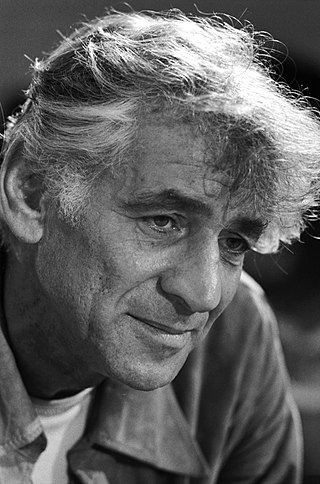
Opening Prayer is a composition for baritone and orchestra, written for the reopening of Carnegie Hall in 1986. Composer Leonard Bernstein set a Hebrew biblical benediction, which concludes a traditional morning service. He derived the music from an earlier piano composition, and later included it in his Jubilee Games in 1988, and in their expansion to the Concerto for Orchestra in 1989, calling the movement now Benediction.

Seven Anniversaries is a collection of short piano pieces by American composer Leonard Bernstein, written between 1942 and 1943. It is the first installment in a series of Anniversaries, followed by Four Anniversaries (1948), Five Anniversaries (1949–51), and Thirteen Anniversaries (1988).
The Short Symphony, or Symphony No. 2, is a symphony written by the American composer Aaron Copland from 1931 to 1933. The name derives from the symphony's short length of only 15 minutes. The work is dedicated to Copland's friend, the Mexican composer and conductor Carlos Chávez. The symphony's first movement is in sonata-allegro form, and its slow second movement follows an adapted ternary form. The third movement resembles the sonata-allegro but has indications of cyclic form. The composition contains complex rhythms and polyharmonies, and it incorporates the composer's emerging interest in serialism as well as influences from Mexican music and German cinema. The symphony includes scoring for a heckelphone and a piano while omitting trombones and a percussion section. Copland later arranged the symphony as a sextet.

Grace Harriet Spofford was an American music educator. She was director of the music school of the Henry Street Settlement from 1935 to 1954.









